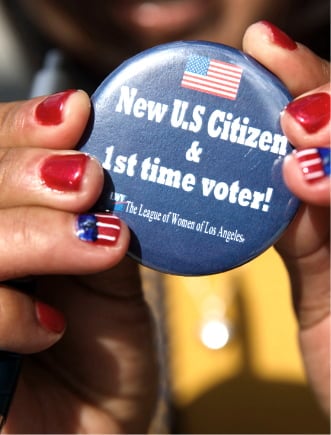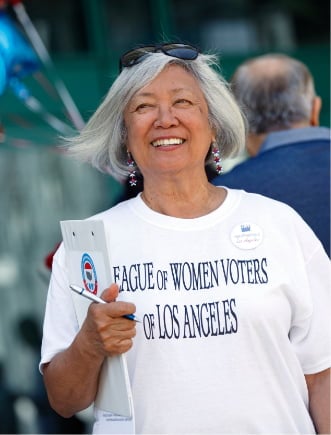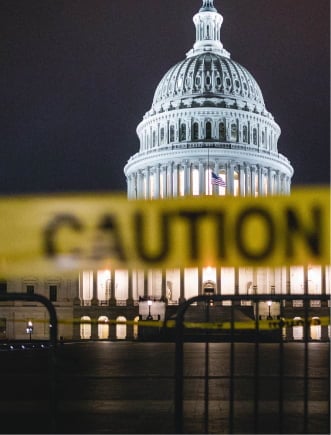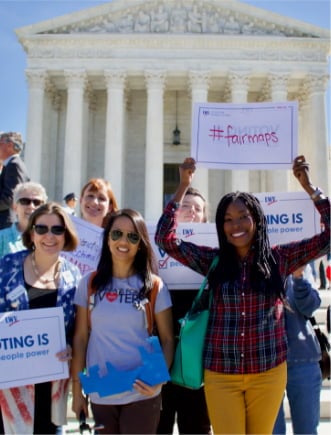This story was originally published on Chapelboro.com.
While much of the focus in Washington D.C. on Friday was more on selecting a new Speaker of the House, the day also marked a solemn anniversary for many. Lawmakers held a moment of silence outside the Capitol to remember the insurrection event on January 6, 2021 and to thank the first responders who were on-scene to respond to the mob of Donald Trump supporters.
Similar recognitions were held across North Carolina, including one organized by the local League of Women Voters in Chapel Hill Friday night.
As the sun set and a chill began to settle in for the evening, a few dozen people gathered at the corner of Franklin Street and Columbia Street. Some people held plastic candles, others wore glow-sticks, and a handful held signs remembering those who protected the transfer of power on January 6, 2021 as Congress certified the results of the 2020 presidential election.
Among those preparing for a brief march with the group down Franklin Street were Amy Jeroloman and Gerrie Richards. The two community members were there as part of the National Organization of Women and shared how often they’d thought of the insurrection two years ago.
“I think about it more than I would like to because it’s such a disturbing event,” Jeroloman said at the start. “When I see any of the video from it, it horrifies me – the amount of violence that people committed that day. But my feelings about it have changed. I think I understand it a lot more because I listened and watched the January 6 House committee [hearings].”
Those hearings – which resulted in a lengthy final report detailing minute-by-minute how the event unfolded and suggested criminal charges against the former president Trump – were a major difference between the anniversary vigil organized by local League of Women Voters members last January. The committee’s hearings and public releases of information helped provide more insight into a historic attempt to change the results of an election and alter the democratic process.
Richards said between the hearings and her personal research, she empathizes more now with those who participated in the insurrection, describing them as feeling lost. But she added that it doesn’t “excuse the way they show their anger,” and makes it so she thinks about what happened on January 6 nearly every day.
“Of all the things that have happened in my life that are historical,” Richards said, “next to 9/11, [I think] this is the most shocking and frightening and motivating thing that I’ve seen.”
The two women, as well as others who gathered Friday night, said they felt compelled to demonstrate because of their support for democracy and voting rights. After its brief march, the group gathered in University United Methodist Church for a discussion of those very topics.
Dr. Jennifer Bremer, the redistricting lead for the local League chapter, helped moderate the talk. The Chapel Hill resident also worked as a professor studying international development and examining how countries create their leadership structures. Bremer told 97.9 The Hill she believes January 6 could represent a marker in the history of the United States for reckoning with extremism.
“There are any number of things you can point to in American history where there was political violence,” she added. “Not an invasion of the Capitol, but nonetheless, political violence. It is something that we have to take as a sign that we have to work harder to fix these problems and to bring people together.”
The discussion included several local elected officials: state representatives Allen Buansi and Renée Price, who spoke in-person, and Congresswoman Valerie Foushee and state senator Graig Meyer, who shared video messages with the group. Buansi and Price each shared their recollection of the afternoon of the Capitol insurrection and their beliefs on protecting democracy, improving voting rights and engaging with those who feel underserved by their government.
Afterward, Buansi shared his impression of seeing people in his hometown taking time to remember and address an event that took place two years and hundreds of miles away.
“It just shows that people care,” the District 56 representative said. “As soon as people stop caring, as soon as people stop talking, that’s when we’re really in trouble. It’s heartening to see this crowd in here – we had some young people, we had a lot of folks who are more seasoned in here. That’s critical in sustaining democracy: have people caring, speaking out and being vigilant.”
The sentiment echoed what Jeroloman said earlier in the evening along Franklin Street: that one of her biggest lessons in recent years is the importance of paying close attention to those in charge.
“There’s so much of our government and democracy that are gentlemanly or womanly agreements – it’s not law,” she said. “And I’ve really seen over the past few years how things I thought were commonplace – like the president releasing their taxes – apparently there’s no law about that. But even when there are laws, where the IRS should be auditing the president, it’s not happening.
“So if you’re not paying attention, I think our democracy can slip away,” Jeroloman added. “And that scares me.”
Will the local League of Women Voters hold a candlelight vigil on January 6, 2024? Bremer said it’s too soon to tell. But she added that it may hinge on how the United States and its residents continue to interact with democracy and free, fair elections.
What You Can Do
The Latest from the League
WASHINGTON — Today the League of Women Voters of the United States’ president Dr. Deborah Turner and CEO Virginia Kase Solomón issued the following joint statement on the anniversary of the January 6th attack on the US Capitol:
North Carolina League speaks out for Voters’ Rights
Supreme Court Finds North Carolina Redistricting Unconstitutional on Racial GerrymanderingLWV Celebrates Major Win for Voters









